 According to a recent study, entitled “Improved Prognosis of Women Aged 75 and Older with Mammography-detected Breast Cancer” and published in the Radiology Journal, mammography may be beneficial for women 75 years and older.
According to a recent study, entitled “Improved Prognosis of Women Aged 75 and Older with Mammography-detected Breast Cancer” and published in the Radiology Journal, mammography may be beneficial for women 75 years and older.
Researchers from the University of Washington School of Public Health and Community Medicine in Seattle set to determine the characteristics and outcomes of women aged 75 years and older with mammography-detected breast cancer, an age group not commonly prescribed this type of diagnosis.
The team designed a prospective cohort study in patients with primary breast cancer, aged 75 years and older, with stage 0–IV disease from 1990 to 2011, and found that throughout this time period, 64% of the breast cancers (including ductal carcinoma in situ) were diagnosed with mammography while 36% were found either by the patient or the patient’s physician. Among the mammography-detected cancers, 62% were stage I, while 59% in the patient/physician-detected group were stage II or III, strongly correlating with increased five-year disease-specific survival for invasive breast cancer in the mammography-detected group (97%) as a consequence of early-stage cancer detection.
Additionally, patients with mammography-detected disease underwent fewer mastectomies and less chemotherapy when compared to patient/physician-detected.
Mammography screening in older women has been a recent focus of discussion, with the US Preventive Services Task Force concluding back in 2009, that there was insufficient evidence to evaluate the benefits and harms of this technique in women 75 years and older. Nonetheless, the American Cancer Society recommends screening older women, provided they don’t have any serious chronic conditions or a shortened life expectancy.
The discrepancies observed in these different recommendations result from a lack of research on women aged 75 and older, even though they represent the highest risk group for breast cancer.
[adrotate group=”3″]
The benefits of early detection should be transmitted to this particular group of patients, since it can translate into less aggressive treatment and better disease-specific survival, since according to the authors, early-stage lesions are potentially treatable without chemotherapy.
Studies have shown that mammography screenings in younger women (50-74 years) is responsible for early breast cancer detection, reducing mortality. This methodology should also be applied to older women, since at the age of 75, life expectancy continues to be an important factor in determining treatment options. Moreover, the current study demonstrates better disease-specific survival in mammography-detected than patient- or physician-detected breast cancer.

